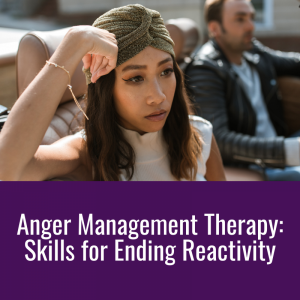5 Signs You Need Therapy
5 Signs You Need Therapy
You might ask ‘What are the signs you need therapy? ’At some point in our lives, we encounter stress, anxiety, mood swings, and other types of emotional suffering. Whether it’s because of a failure in the workplace, rejection, problems with money, interpersonal conflicts, a death in the family, or another reason, we usually are able to recover eventually. However, occasionally, we might want a little extra assistance to do so.
You might not be able to “snap out of it” because you’re feeling down or empty. Or perhaps you’ve noticed some unhealthy patterns in your behavior that you find difficult to change. The symptoms of mental or emotional strain might sometimes be plain to see. However, sometimes it is more difficult to identify them.
Our energy, productivity, and general health are directly impacted by our emotions, thoughts, and actions. Taking care of your mental health makes it easier for you to deal with stress and problems in daily life. This is why it’s so important to pay attention to your mental health and get assistance if you feel that things are out of control.
What is Therapy?
When they hear the word “therapy,” a lot of people panic. Contrary to popular belief, however, psychotherapy is not only for people who are experiencing mental illness. Anyone who wants to improve their life yet is under stress, going through high emotions, or going through life transitions may find it helpful.
You can explore your options, vent about your experiences, and get the skills to deal with a variety of life difficulties through psychotherapy or talk therapy.
Psychotherapy comes in a variety of formats. Knowing what to anticipate from the treatment you or your child is undergoing is so crucial. These are the main types of psychotherapy:
- interpersonal psychotherapy
- psychoanalytic psychotherapy
- cognitive analytical therapy
- systemic psychotherapy
- humanistic therapy
It’s critical to keep in mind that asking for help is not a sign of weakness yet a crucial step on the road to self-care. You can get back on track more quickly the earlier you seek assistance. Below, you can find the signs that indicate you should consider therapy.
1. You find it difficult to manage your emotions successfully.
Even while everyone experiences sadness, anxiety, or anger at some point in their lives, it’s crucial to be aware of how frequently or strongly a person experiences any of these feelings. Anger frequently appears as part of a depressed episode. In fact, because men’s irritability or short temper is mistakenly seen as a masculine trait, melancholy in males is frequently overlooked. Uncontrolled rage can also signify negative thoughts about oneself or the outside world, frustration, or a poorly controlled stress response, in addition to despair.
In a similar vein, persistently feeling down, empty, and uninterested in anything could be an indication of clinical depression. This is distinct from a depressed mood, which everyone experiences occasionally.
Many adolescents and young people exhibit impatience, wrath, or hostility toward others rather than experiencing increasing grief. Therapy can help you to better manage emotions. Think of your therapy as an honest, objective, and private environment that helps you to examine painful sensations, comprehend their underlying causes, put them in context, and learn coping mechanisms to overcome such sentiments.
2. Your performance in school or at work is decreasing.
One of the symptoms of psychological or emotional problems is a decline in performance at work or school. Mental health problems can affect one’s ability to pay attention, concentrate, remember things, have energy, and be energetic. They can also cause apathy, which can make it difficult to enjoy or even want to go to work. It could cause a lack of interest and mistakes at work, which would lower production. Even more so, it could endanger you or others.
For instance, whether you’re a caregiver, doctor, law enforcement official, or someone who drives or operates machinery. By actively solving problems and practicing relaxation techniques, a therapist can help you learn how to successfully self-regulate your behavior and develop more adaptive coping mechanisms for stress.
3. You notice changes or distruption in sleep or appetite.
Our sleep and appetite can be significantly impacted by mental health problems. A person who is worried or manic may have trouble sleeping, yet a person who is really sad may sleep all the time.
When under stress, some people overeat to numb their emotions, while others find they can barely eat. Therefore, it may be time to take a step back and carefully evaluate the issue if you realize that you have been eating or sleeping either less or more than usual for an extended length of time.
4. It is difficult for you to build and maintain relationships.
Our mental health can have a range of effects on our relationships, including making us withdraw from those who are important to us, creating uneasiness in a partnership, or making us severely rely on another person for emotional support. People experiencing psychological or emotional difficulties may find it challenging to build relationships at work or school, collaborate in teams, or communicate with superiors, coworkers, or subordinates.
New or ongoing relationships may suffer as a result of any of these circumstances. Therapy can be helpful if you frequently find yourself at odds with people or struggle to express your emotions to others. You can learn better social skills from a qualified therapist, like respectful assertiveness.
5. You experienced a traumatic event.
Talk therapy can also help those who have experienced past physical or sexual abuse or other trauma from which they have not yet entirely recovered. In a private, judgment-free setting, psychotherapy enables a person to discuss these traumatic events with a professional skilled at listening to these concerns.
Additionally, the client is not concerned with “protecting” the therapist from learning about these experiences. A therapist can also assist the patient in learning skills for overcoming associations and the hold that the trauma has over them as well as new ways of thinking about the terrible incident.
Check Out All Our Additional Therapy Video
Positive Body Image: Learn to Love Your Look
Anger Management Counseling – Get Video Help Now
Couples Communication and Love Language Strategies
About Life Coaching and Therapy
Life Coaching and Therapy (LCAT) is a therapy and coaching practice that transforms our clients lives through our flexible. Multi-technique approach and pleasure-skills training provided by systematically-trained and licensed therapists!
 Get to know our founder and owner, Amanda Pasciucco, (a.k.a. The Sex Healer) PhD, Licensed Marriage and Family Therapist (LMFT), and an AASECT Certified Sex Therapist (CST) that has developed innovative therapy programs and therapy videos that get results.
Get to know our founder and owner, Amanda Pasciucco, (a.k.a. The Sex Healer) PhD, Licensed Marriage and Family Therapist (LMFT), and an AASECT Certified Sex Therapist (CST) that has developed innovative therapy programs and therapy videos that get results.
Our team of compassionate, licensed therapists and certified sex therapists help all clients who visit us for a variety of personal, relationship, intimacy and sex problems.
LCAT provides on-site appointments, as well as video chat and text therapy programs.
Learn more about how LCAT can help improve your life at What We Do.









